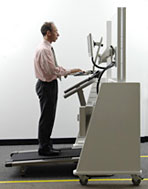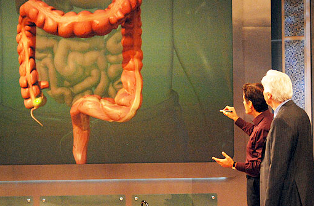September 19th, 2010 by Maria Gifford in Better Health Network, Expert Interviews, Health Tips, Research
No Comments »
 Obesity doesn’t stand a chance against Dr. Jim Levine, one of the prestigious presenters at Mayo Clinic’s Transform 2010 conference last week. Dr. Levine’s fascinating research focuses on helping people understand obesity, weight reduction, and Non-Exercise Activity Thermogenesis (NEAT) — the idea that expending calories through the activities of daily living is more important for calorie burning than exercise is.
Obesity doesn’t stand a chance against Dr. Jim Levine, one of the prestigious presenters at Mayo Clinic’s Transform 2010 conference last week. Dr. Levine’s fascinating research focuses on helping people understand obesity, weight reduction, and Non-Exercise Activity Thermogenesis (NEAT) — the idea that expending calories through the activities of daily living is more important for calorie burning than exercise is.
Dr. Levine’s “Treadmill Desk” has won more than 50 national and international awards in science, including the Judson Daland prize from the American Philosophical Society, the Invention of the Future Award from NASA, and the Innovation Award at the World Fair. The “Walkstation” is now a product of Steelcase.
Dr. Levine’s work has been highlighted nationally around the world, and he has produced documentary films with the BBC, ABC, and CNN. His Walkstation has been featured in The New York Times, his vision of a future where office people walk at work in USA Today, and his Treadmill Desk tested live on Good Morning America. Read more »
September 14th, 2010 by Shantanu Nundy, M.D. in Better Health Network, Health Tips, Opinion, Research
No Comments »

The science of nutrition is changing and not in the way you might expect. After years of “reductionist” thinking — where food has been viewed as the sum of its parts -– a call to treat food as food has been sounded. No more poring over nutrition labels to calculate grams of fat or chasing down the latest go-to chemical –- be it vitamin E, fish oil or omega-3. Instead we are being asked to call a potato a potato and a piece of steak — well, a piece of steak.
If you haven’t heard about this sea change yet, you are not alone. The food science industry that markets “food products” for our consumption has done a good job giving their laboratory creations a semblance of health with phrases like “low fat” and “high in vitamin C.” For our part, the medical community is also to blame. Despite evidence to the contrary, we have been slow to renounce the “fat is bad” mantra or break away from the nutrient-based approach to eating that first swept the country over 30 years ago. Read more »
*This blog post was originally published at BeyondApples.Org*
September 3rd, 2010 by Jon LaPook, M.D. in Better Health Network, Health Tips, News, Research, True Stories
No Comments »
 Dr. Mehmet Oz just might be the last person on earth people would expect to get a colon polyp. He’s physically fit (he left me in the dust the last time we ran together), he eats a healthy diet, he doesn’t smoke, and he has no family history of colorectal cancer or colon polyps.
Dr. Mehmet Oz just might be the last person on earth people would expect to get a colon polyp. He’s physically fit (he left me in the dust the last time we ran together), he eats a healthy diet, he doesn’t smoke, and he has no family history of colorectal cancer or colon polyps.
But several weeks ago, when Mehmet had his first screening colonoscopy at age 50, I removed a small adenomatous polyp that had the potential to turn into cancer over time. Statistically, most small polyps like his don’t become cancer. But almost all colon cancers begin as benign polyps that gradually become malignant over about 10 to 15 years.
Since there’s no way of knowing which polyps will turn bad, we take them all out. The good news is there’s plenty of opportunity to prevent cancer by removing these polyps while they are still benign. But only about 63 percent of Americans between ages 50 and 75 get screened for colorectal cancer. Read more »
August 29th, 2010 by Berci in Better Health Network, Health Tips, News, Opinion, True Stories
No Comments »

Here is a recent piece in the New York Times by reporter Brian Stelter who decided to lose weight by 1) getting support from fellow Twitterers, and 2) by tweeting everything he eats throughout the day. An excerpt:
I knew that I could not diet alone; I needed the help of a cheering section. But rather than write a blog, keep a diary or join Weight Watchers, I decided to use Twitter. I thought it would make me more accountable, because I could record everything I ate instantly. And because Twitter posts are automatically pushed to each person who subscribes to them, an audience — of friends or strangers — can follow along.
What’s surprising is that he didn’t start using some kind of data-collecting application. Read more »
*This blog post was originally published at ScienceRoll*
August 29th, 2010 by Toni Brayer, M.D. in Better Health Network, Health Tips, True Stories
No Comments »

 I know it’s not politically correct to look at what other people buy at the grocery store, but as a physician I just can’t help noticing. Some carts contain huge containers of soda pop, Doritos, frozen pizza, and other packaged goods.
I know it’s not politically correct to look at what other people buy at the grocery store, but as a physician I just can’t help noticing. Some carts contain huge containers of soda pop, Doritos, frozen pizza, and other packaged goods.
I’m not surprised, because at the end of every isle is a display case that offers the giant soda for 89 cents or the Doritos on special for $1.29. With this type of marketing, it takes a strong person to resist the “bargain.”
Yesterday the woman in front of me (overweight, middle-aged) had a strange assortment of goods that she probably thought would help her lose weight. She had several Weight Watcher-type meals, diet drinks, power bars, and lots of “light” items — “light butter,” “light crackers,” “light yogurt,” and “light ice cream.”
Folks, this won’t work. Eating this way won’t help her lose weight. She needs to make dramatic changes to drop the pounds. Read more »
*This blog post was originally published at EverythingHealth*
 Obesity doesn’t stand a chance against Dr. Jim Levine, one of the prestigious presenters at Mayo Clinic’s Transform 2010 conference last week. Dr. Levine’s fascinating research focuses on helping people understand obesity, weight reduction, and Non-Exercise Activity Thermogenesis (NEAT) — the idea that expending calories through the activities of daily living is more important for calorie burning than exercise is.
Obesity doesn’t stand a chance against Dr. Jim Levine, one of the prestigious presenters at Mayo Clinic’s Transform 2010 conference last week. Dr. Levine’s fascinating research focuses on helping people understand obesity, weight reduction, and Non-Exercise Activity Thermogenesis (NEAT) — the idea that expending calories through the activities of daily living is more important for calorie burning than exercise is.


 Dr. Mehmet Oz just might be the last person on earth people would expect to get a colon polyp. He’s physically fit (he left me in the dust the last time we ran together), he eats a healthy diet, he doesn’t smoke, and he has no family history of colorectal cancer or colon polyps.
Dr. Mehmet Oz just might be the last person on earth people would expect to get a colon polyp. He’s physically fit (he left me in the dust the last time we ran together), he eats a healthy diet, he doesn’t smoke, and he has no family history of colorectal cancer or colon polyps.

 I know it’s not politically correct to look at what other people buy at the grocery store, but as a physician I just can’t help noticing. Some carts contain huge containers of soda pop, Doritos, frozen pizza, and other packaged goods.
I know it’s not politically correct to look at what other people buy at the grocery store, but as a physician I just can’t help noticing. Some carts contain huge containers of soda pop, Doritos, frozen pizza, and other packaged goods.







